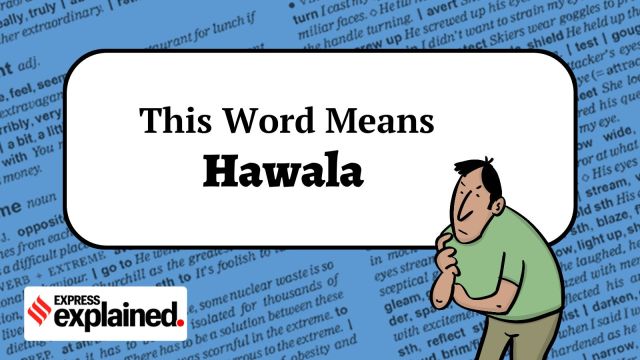This Word Means: Hawala
Every day, 500 words on a word (or expression) that has appeared in The Indian Express
 It is often said that hawala “sends money without sending money”.
It is often said that hawala “sends money without sending money”.Why now?
A poaching network in central India, using digital payments with “hawala funds” and multiple supply lines to Nepal and Myanmar, has taken out “100 to any number” of tigers since 2022, an investigation by The Indian Express has found. Click here to read more.
What is hawala?
It is often said that hawala “sends money without sending money”, that is, it facilitates the transfer of funds without any physical money changing hands. But if you think about it, that’s how any bank transaction works.
The principal difference is that hawala transactions pass through informal, unregulated channels on a trust basis. There is a huge network of hawala brokers (known as hawaladars) who facilitate these transactions. Although they are spread around the world, a vast majority of them operate out of West Asia, North and East Africa, and the Indian subcontinent.
How does hawala work?
Consider a person (let’s call him ‘A’) working in Muscat who wants to send money to his father (‘B’) in Lucknow by hawala. ‘A’ will have to first deposit the money with a hawaladar in Muscat in exchange for a token — this can be a physical token, say a bank note, or some code that can be transferred via a phone call or through some other electronic means. Either way, ‘A’ has to pass the token on to ‘B’ who will then go to a hawaladar in Lucknow where he will collect the money in exchange for the token.

As you see, no physical money has changed hands in the whole process, that is, money did not actually travel between Muscat and Lucknow. The hawaladars at both ends of the transaction will later settle accounts. This can happen in one of many ways. To know more refer to El-Qorchi et al, ‘Economic Analysis of Informal Hawala Transactions’, in the IMF’s Informal Funds Transfer Systems (2003).
Who uses hawala? Why?
Despite there being no legal recourse in case of fraud, hawala transactions are popular, and see a variety of uses.
SENDING REMITTANCES: Remittances are funds sent by migrant workers to their homes, to support their families. Many migrants, especially those working in West Asia, use hawala because of convenience and lack of access to formal banking systems. This is in part due to the relative lack of penetration of traditional banking institutions in Islamic countries. Collecting interest — as banks tend to do — is barred under Islamic law.
ILLEGAL ACTIVITIES: While sending remittances using hawala may or may not be illegal, many illegal operations — from smuggling and money laundering to drug trade and terror finance — use hawala networks for the anonymity, and lack of regulation and scrutiny they offer.
This is why hawala has gained notoriety over the years, especially following the September 11, 2001 terror attacks in New York. After the attacks which killed almost 3,000 people, security agencies around the world, especially in the US, cracked down on terror financing and hawala networks.
Today hawala transactions are outrightly banned in many jurisdictions, although this has not stopped such networks from continuing to thrive.
More Explained
Must Read
EXPRESS OPINION
Mar 30: Latest News
- 01
- 02
- 03
- 04
- 05



























